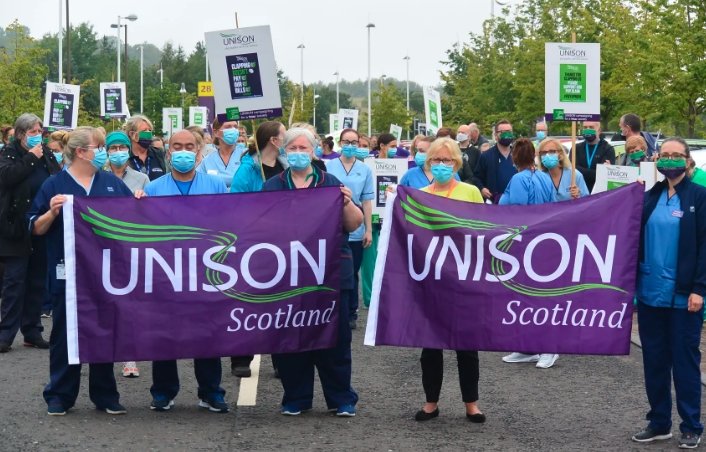Tackling poverty in Scotland cannot happen without properly funded public services. That’s why Unison is leading the charge on the crucial debate about where that funding will come from, writes Lilian Macer, Unison Scottish Secretary and STUC President.
The Importance of Public Services
Scotland’s public services are the backbone of the community, providing opportunities and acting as a safety net for those in need. Services such as education, health, social care, and environmental services are essential to the fabric of society. Yet, many of these services are underfunded, struggling with outdated tax structures, and seeing a decline in both quality and staff welfare.
For too long, public service workers—many of whom are already underpaid—have been asked to do more with less. From NHS staff facing the longest waiting lists since devolution, to social care services that are overburdened, the struggle is real for those on the front lines.

A Call for Action on Public Service Funding
Unison, in collaboration with the Poverty Alliance, has been urging political parties to engage in a serious debate about the future of public services. How much are Scots willing to pay for quality services? The goal is to shape the Scottish Parliament campaigns ahead of the 2026 elections, by ensuring public service funding becomes a priority.
So far, the campaign has had a positive impact, especially during fringe meetings at the Scottish Labour and Scottish Lib Dem conferences, where party members have shown a keen interest in these issues. The upcoming Scotland Demands Better demonstration in Edinburgh on October 25 is also an important moment to push for change.
The Failure of Austerity and the Need for Investment
The election of a Labour government last year gave many hope for change, especially with the promise of the Employment Rights Bill. However, despite these positive intentions, the government has since made eye-watering cuts to welfare, exacerbating poverty and increasing reliance on foodbanks. As Unison highlights, it is not just about rhetoric but about taking bold action to invest in public services and social security.
For a fairer Scotland, the public sector must be properly funded, and the government must move away from austerity-driven policies that have only deepened inequality. Public services are the key to providing a safety net for vulnerable communities, and addressing the issues facing these services requires long-term investment.
The Poverty Crisis in Scotland
Poverty remains a significant challenge, with around one million Scots living in poverty, half of whom are in deep poverty. A quarter of those living in poverty are children. These figures have remained largely unchanged for over a decade, and the situation is exacerbated by insecure work and wages that are below the Scottish Living Wage.
Women-dominated sectors, such as early years education, care work, and cleaning, are particularly affected by these issues, with many workers having to juggle multiple part-time jobs just to make ends meet. The response from both Holyrood and Westminster has often been underwhelming, with little political will to tackle the structural causes of poverty.
The Need for a Balanced and Progressive Approach
Scotland’s public services rely on skilled workers, and their pay should reflect the value of the work they do. Investing in staff is investing in services—whether it’s a nursery with trained early years practitioners, a library with librarians, or an ambulance service with paramedics. This applies to less visible but equally essential services, like environmental health, social work, and career advice.
Unison acknowledges that funding public services will require tough decisions, but says the solution cannot simply be more cuts. Instead, a balanced and progressive tax system is needed—one that can support public services while also ensuring that the wealthiest contribute their fair share. This is where the debate needs to shift: how can Scotland ensure long-term, sustainable funding for the services it needs?
A Call for Progressive Tax Reforms
Tinkering with the tax base won’t solve the problem, and simplistic solutions like “tax the rich” often miss the deeper issues at play. Unison argues that a fairer and more effective system needs to be created—one that ensures councils have more control over their own revenue and spending, rather than relying on central government, which often restricts how money can be used.
Public services are vital to a fairer society, and poverty will only be tackled when services that support the most vulnerable are given the resources they need to thrive. Unison believes that Scotland needs a balanced, progressive settlement to protect the most vital services.
Looking Ahead to the 2026 Scottish Election
As we approach the 2026 Scottish Parliament elections, Unison is determined to keep the conversation about public services and their funding at the forefront. The people of Scotland must decide what quality of services they want and how much they are willing to pay for them. Unison’s campaign is just the beginning, but it’s an essential first step in shaping a fairer future for all.


















